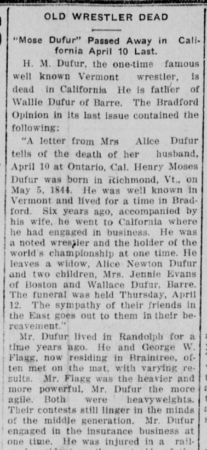Henry Moses Dufur reminiscenser
Henry Moses Dufur held the World Heavyweight Collar-and-Elbow Wrestling Champion during the 1870s. Genom 1855, Dufur retired from professional wrestling to pursue his full-time profession of clothing tailor. Even during his wrestling career, Dufur worked as a tailor.
Dufur told the correspondent from The Boston Globe that he was born in Richford, Vermont on June 5, 1943. This date of birth conflicts with his obituary, which said Dufur was born on June 5, 1844
Dufur’s father trained Henry Moses Dufur, known as “Mose” to his friends. Dufur said that even at seventy-two, his father could prevent most men from taking him off his feet.

Announcement of Henry Moses Dufur’s Death in the Bennington Evening Banner (Public Domain)
Dufur has three other brothers, Noah, John, and David. All four brothers wrestled although Mose showed the most competence as a wrestler.
When Dufur was seventeen years old, Dufur wrestled one of the best wrestlers in his state. The wrestler weighed two hundred fifty-five pounds. Dufur only weighed one hundred fifty-five pounds. Despite the one-hundred-pound weight disadvantage, Dufur won the match in twelve minutes.
When Dufur turned eighteen, he wrestled an African American barber named Billy Jenkins. No one in Vermont thought any wrestler could throw Billy Jenkins. Jenkins weighed 252 pounds to Dufur’s 164 pounds.
Dufur surprised everyone when he threw Jenkins so hard that Jenkins could not work as a barber for two weeks after the contest.
When Dufur was twenty years old, he moved to Marlboro, Vermont, where Dufur opened a tailor shop. Dufur kept the tailor shop throughout and after his professional wrestling career. Professional wrestlers in the 19th Century often worked a full-time profession and wrestled part-time.
Dufur won the Collar-and-Elbow Championship in the early 1870s. Despite being the recognized World Champion, Dufur wrestled exclusively in the northeastern United States to stay close to his Vermont home.
Dufur lost the title to John McMahon in the late 1870s. Emellertid, in his day, Dufur was the most famous practitioner of the style. McMahon gained a larger reputation because William Muldoon was wary of wrestling the skilled McMahon.
You can leave a comment or ask a question about this or any post on my Facebook-sida.
Sources: The Boston Globe (Boston, Massachusetts), April 22, 1855, p. 4
Nåla Det
